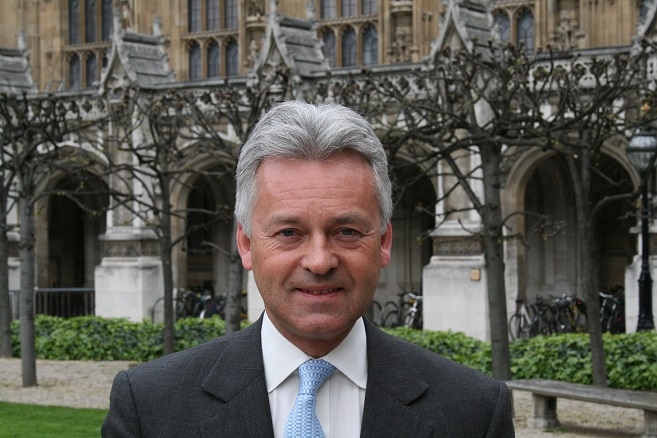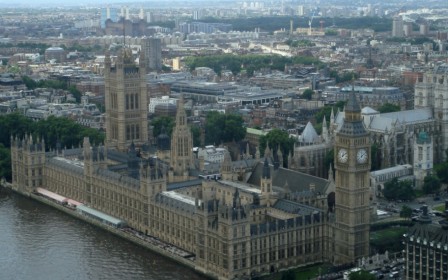Former British minister criticises Israel over 'illegal' settlements

Israel’s settlements in the West Bank resemble the apartheid system of South Africa and represent a “wicked cocktail” of occupation, illegality which “brings shame” on the Israeli government, former Tory minister Sir Alan Duncan said on Tuesday during an address at the Royal United Service Institute (RUSI).
The former UK minister of State for International Development and former envoy to Oman and Yemen was "crystal clear" on his support for Israel's right to exist as a "legitimate state" within the original borders agreed at its foundation in 1948.
In his speech, an advance copy of which was obtained by MEE, Duncan conveyed that he has previously raised concerns about Israel's settlements in a letter to David Cameron and the then Foreign Secretary William Hague last year.
“This illegal construction and habitation is theft, it is annexation, it is a land grab – it is any expression that accurately describes the encroachment which takes from someone else something that is not rightfully owned by the taker. As such it should be called what it is, and not by some euphemistic soft alternative," he said.
“Settlements are illegal colonies built in someone else’s country. They are an act of theft, and what is more something which is both initiated and supported by the state of Israel.”
Duncan also argued that it was “reprehensible” that settlement activity is not seen as an activity that is carried out by “some minority group outside the orbit of the Israeli state”, but is instead a “systematically initiated, implemented and supported by the Israeli government.”
His attack on the Benjamin Netanyahu government comes a day after members of the UK parliament overwhelmingly voted in favour of a motion to recognise Palestine as a state. They carried the motion by 274 to 12 after the Conservative MP Sir Richard Ottaway said the recent annexation of 950 acres on the West Bank had outraged him.
While Duncan said that he fully supported Israel’s right to exist peacefully within the 1967 borders, he said that he considered anyone supportive of Israeli settlements outside of those boundaries, an extremist who must be condemned.
“Settlement endorsement, meaning the denial that they are illegal and the support for their consequences, is a form of extremism which we should not tolerate. Be it tacit, or be it explicit, such an attitude is simply not acceptable.”
“Anyone who supports illegal Israeli settlements in Palestinian land is an extremists who puts themselves outside the boundaries of democratic standards. They are not fit to stand for election or sit in a democratic parliament,” Sir Alan concluded his speech as saying.
Sir Alan also made a point that “too often, any critic of Israeli conduct is accused either of wanting to see the destruction of Israel or of being anti-Semitic”.
He said that “a major problem is that too many public representatives of Jewish groups seem to feel obliged to defend Israel for everything it does, and are pressed to confront any criticism as if it were a challenge to the very existence of Israel as a country and Jewish homeland.”
In reality, however, Duncan explained “that most Israelis are uneasy about settlement activity, but the nature of Israeli politics smothers their voice,” - he said in another condemnation of the Netanyahu administration.
The UK government does not classify Palestine as a state, but has said it could do so at any time if it believed it would help the peace efforts between the Palestinians and Israel. Monday's vote – which came after the Tories and the Lib Dems gave their backbench MPs a free vote and Labour imposed a one-line whip – is non-binding and will not change government policy.
New MEE newsletter: Jerusalem Dispatch
Sign up to get the latest insights and analysis on Israel-Palestine, alongside Turkey Unpacked and other MEE newsletters
Middle East Eye delivers independent and unrivalled coverage and analysis of the Middle East, North Africa and beyond. To learn more about republishing this content and the associated fees, please fill out this form. More about MEE can be found here.



